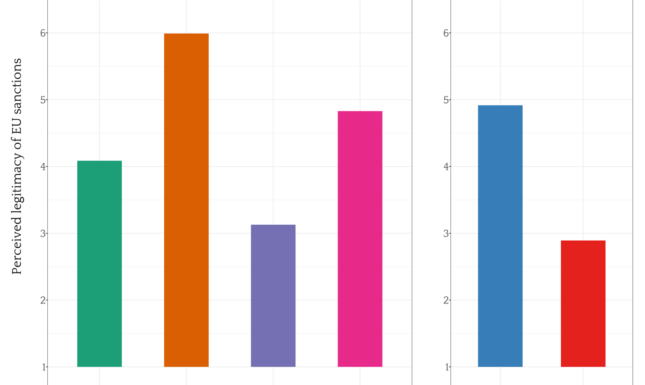When the rule of law is at stake, many people support sanctions even against their own state
The EU has imposed financial sanctions on Poland for problems with judicial independence. The sanctions amount to more than €300 mill., and the sum continues to grow. How are the sanctions perceived by the Polish population? Are they considered justified and acceptable, and by whom?
In October 2021 the EU imposed on Poland financial sanctions related to problems with judicial independence in the country. Almost one year later, these sanctions amount to more than €300 mill., and the sum continues to grow every day.
Are Polish people aware of these financial penalties? Do they support the sanctions against their own country and, if so, why? If not, what can persuade them to change their minds? To answer these questions, we – an interdisciplinary team of researchers from Leiden University – designed and fielded an original nationally-representative public opinion survey in Poland in July 2022 (N=1200). We got some important and unexpected results.
Sanction awareness was rather limited, despite the huge amount of money involved and the frequent discussions in Polish media. Only about half (48%) of the Polish population said they had heard about the case and had sufficient information about it. Importantly, about half (49%) of the people said they did not know the size of the financial penalties that Poland had to pay. Only 34% picked the right answer (out of four options provided) of 1 million euro per day. Even more remarkably, only half of the respondents who said they have sufficient information knew the right amount.
Did people consider the sanctions legitimate? We asked four related questions about (a) whether people found the sanctions justified, (b) whether they support the EU sanctions against Poland, even if they hurt the country financially, (c) whether Poland should obey the EU enforcement actions and (d) pay the financial penalties imposed. Overall, there was moderate support for the EU sanctions: on average, 4.4 on a 7-point scale. This level of support is still quite high, considering the politicized nature of the debate about judicial independence in Poland.


While demographic factors were not strong predictors of support for sanctions, political ones were very important (see Figure 1). Voters of the parties that had started the judicial reforms leading to the EU sanctions (Law and Justice) and supported Poland’s defiance of the EU rulings (the Confederation around KORWiN) were on average 3 points less likely to support and find the sanctions justified than voters of pro-European parties (Civic Coalition and The Left). They were also less likely to know the exact size of the sanctions. However, they were not less likely to report that they had sufficient information about the case.
Similarly, people with exclusive national identity (who feel attached to Poland but not to Europe), were on average 2 points less likely to support and find the sanctions justified than people with non-exclusive national identity (see the right panel of Figure 1). They were also less likely to know the right size of the sanctions, but they were not less likely to report that they had sufficient information about the case. Overall, political and national loyalties predicted strongly whether one considered the EU sanctions legitimate. They also predicted actual knowledge of facts about the enforcement case, but not the self-perception people had about whether they knew enough about the case or not.
We also investigated whether it is possible to sway people’s opinion about the sanction by providing them with different relevant information. To do so, we used an experiment in which respondents were randomly assigned to read one of five arguments. We found no evidence for strong effects of the arguments we provided, with one exception. Informing people that the rule of law and judicial independence enjoy very high levels of public support in Poland increases the acceptance of the sanctions. But this effect is stronger for people who are already predisposed to have a favourable opinion based on their political allegiance and national identity. Overall, information about the likely effects of sanctions or their procedural (un)fairness does not change significantly the opinion of the Polish population and could only reinforce their prior beliefs.
Why are these results important for global governance?
Judicial independence is a crucial element of the rule of law. The EU, and other international organizations, have the rule of law at their heart and need to defend it. But nobody likes to be punished, and few like to bear the costs of punishing. Harsh financial and other sanctions could turn citizens – especially of the countries targeted by enforcement actions – against the EU. That’s why it is important that we find rather high levels of acceptance and support for the EU sanctions even in Poland. Having said that, there are significant differences in opinion among the population driven by political allegiances and social identities. In the polarized Polish political environment, acceptance of the EU sanctions is strongly related to the political party you support and whether you see yourself as European or not. Perhaps that’s why it is so difficult to offer any arguments that can change people’s minds about the legitimacy of EU enforcement actions, even in an environment where people know little about them.
In conclusion, not everyone in Poland likes their country being sanctioned for violations of the rule of law, and there is not much one can say to change their mind. At the same time, a significant part of the population supports the sanctions, and their support is susceptible to reinforcement and resistant to arguments about possible negative effects of sanctions. This means that by imposing sanctions for the violations of the rule of law, the EU defends the democratic values of a majority of Polish citizens.
Acknowledgement: The survey is part of the project ‘The Challenge of Enforcing Rule of Law in International Organizations: Winning the Public and Resisting Populist Attacks [CHARLIO]’, supported by the GTGC Global Transformations and Governance Challenges Initiative of Leiden University. A detailed exposition of our study is available as a working paper at: https://osf.io/6rnxv. The results have not been peer-reviewed yet.





